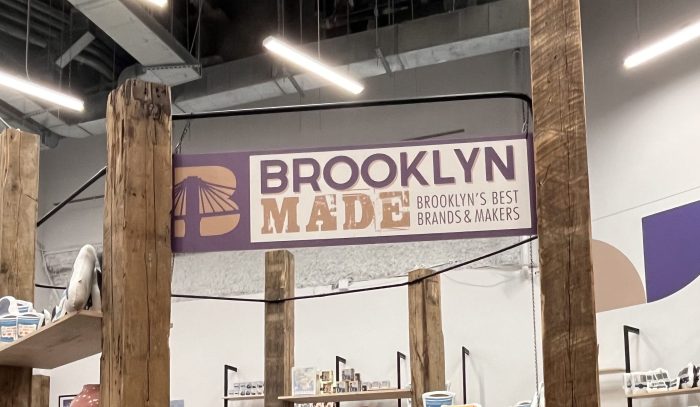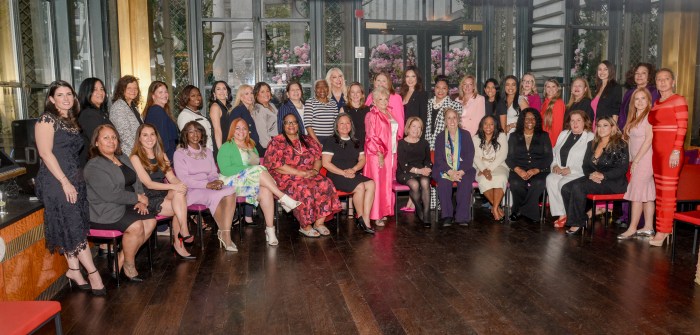After a night of nail-biting, former Bronx borough president gets a noontime lift
The mood at Fernando Ferrer’s campaign party, in the Puck Building’s Grand Ballroom on Tuesday night, was one of cautious optimism.
Although the campaign was confident that they would receive the most votes in the four-person race against C. Virginia Fields, Gifford Miller, and Anthony Weiner, there was anxiety among staffers as to whether their candidate would get the 40 percent needed to avoid a run off.
Speaking early in the evening, before the polls had closed, press secretary Christy Setzer, when asked whether she thought her candidate would get 40 percent of the vote, said “I’m optimistic about a win,” but was hesitant to say whether Ferrer would gain the nomination outright this week.
With all of the precincts reporting, Ferrer had 39.95 percent of the vote and Weiner had 28.82 percent. The anxiety and uncertainty that permeated the room earlier in the night lingered with the Ferrer camp until noon Wednesday when Weiner officially conceded. While Ferrer did not have the big, definitive win he had hoped for, beginning Wednesday the Ferrer camp was poised to unite New York City Democrats around his candidacy.
Ferrer is fortunate to avoid the cost and diversion of the runoff, even though a formal vote on September 27 might still be necessary should his total, after an official count that includes absentee and paper ballots, still struggles below 40 percent. With Weiner having conceded, of course, the vote would simply be a curious sideshow.
In his remarks Tuesday night, Ferrer told supporters. “The road has been long, but the journey has been worth it. We are going to change history.”
Allies including Eliot Spitzer, the New York State attorney general who is likely to be the 2006 Democratic nominee for governor, proclaimed victory for Ferrer at 11 p.m. on the dot, just as the local news broadcasts were beginning, and roughly 20 minutes before the candidate himself appeared.
“We have a wonderful victory for New York. We want a real Democrat to be mayor of the city of New York,” Spitzer said. Al Sharpton, who renewed his 2001 endorsement of Ferrer just two days before the primary, told the crowd, “We have a mayor in Freddy Ferrer.”
In his customary impassioned and lively tone, Sharpton said “New Yorkers voted because we want a mayor for the whole city.”
Issues of race, ethnicity, and class were consistently emphasized throughout the evening. In a room where white people were in the minority, the Ferrer campaign represented what might be the new landscape of New York City politics. In November, according to The New York Times, non-Hispanic whites are projected to constitute a minority of the voters in the mayoral general election for the first time, nearly two decades after they became a minority of city residents. This factor, many speculate, provides one of the few promising indicators for Ferrer, who is Puerto Rican, in what is generally viewed as a decidedly uphill campaign against Republican incumbent Michael Bloomberg, a self-financed billionaire who is enjoying strong poll numbers.
A recent New York Times poll found that 50 percent of New York City Democrats said they would vote for the mayor, taking the party’s huge numerical advantage in voter registration off the table for Ferrer.
Knowing Bloomberg’s commanding position, Ferrer is taking every opportunity to differentiate himself from the wealth and privilege that have been defining characteristics of Bloomberg’s life. In what can now be viewed as his victory speech, he told the crowd, “A new city is rising to help the poor. If you work two jobs and can’t pay the rent, a new city is rising. Your time is now.”
This sentiment was echoed by New York City Comptroller William Thompson, also on hand at the Puck Building, who defined the race between Ferrer and Bloomberg as the “people’s camp versus the money camp.”
With a candidate officially named, organizations that endorsed Miller, Weiner, and Fields are going to have to take steps, in the next few days, to formally realign themselves with Ferrer. This is particularly the case in the gay community where many organizations endorsed Miller. Melissa Skarlz, president of the Gay and Lesbian Independent Democrats (GLID) , a Manhattan club that supported Miller in the primary, told the Gay City News in a telephone interview, “We are happy to support Freddy Ferrer. We agree with his progressive vision for New York.”
Ferrer will undoubtedly communicate his strong support for key gay political goals—including his willingness to withdraw Bloomberg’s appeal of the February state court ruling ordering the city clerk to issue same-sex marriage licenses—in his appeal for votes on November 8.
“Hope and opportunity should be equal in every borough,” he told his supporters on Tuesday evening. “Destiny should not be limited by your past. We have brothers and sisters all over New York City.”
gaycitynews.com

































